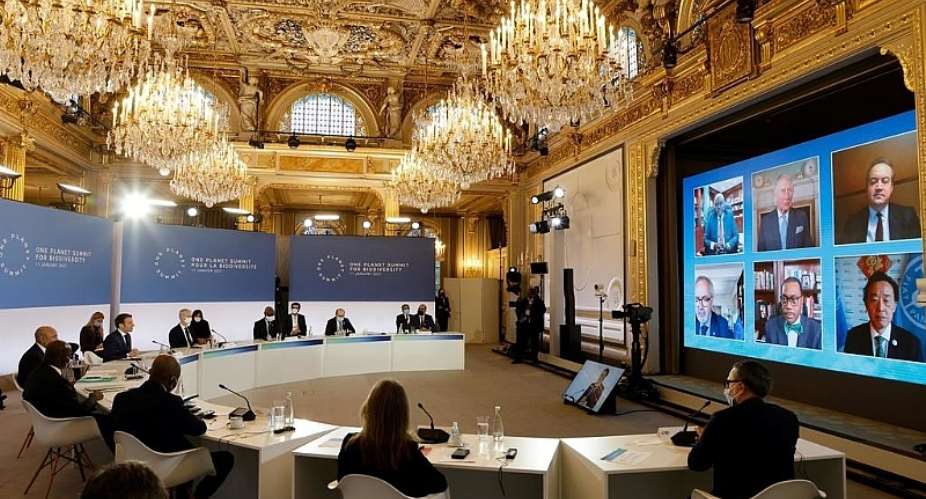While some decried the one-day One Planet Summit hosted by French president Emmanuel Macron, others say it is reassuring that world leaders are finally recognising the importance of protecting ecosystems for the survival of the human species.
"We have been poisoning air, land and water, and filling our oceans with plastic. And now nature is striking back," UN chief Antonio Guterres told the meeting, giving the Covid-19 crisis as a prime example.
"Until now, we have been destroying our planet, abusing it as if we had a spare one," he said, pointing to biodiversity targets set a decade ago that have all been missed.
“We must face up to the failure, not to be alarmist… just to accelerate our action with very concrete things and a realistic follow-up,” said Macron.
Some 30 world leaders, officials and heads of international organisations attended the summit by video link, and they agreed that protecting nature is key to human survival. At risk are the clean air, water and healthy ecosystems, on which humans depend.
Macron announced that more than 50 countries have backed the so-called “30-30” initiative to protect 30 per cent of the planet by the year 2030, a plan introduced by the High Ambition Coalition for Nature and People, launched in 2019 by France, Costa Rica and the UK.
Currently only 15 per cent of land and seven per cent of oceans are protected.
Indigenous people's concerns
Key to protecting natural areas will be indigenous people, “the custodians of 80 per cent of the world's biodiversity”, said Karl Burkhardt, Managing Director of One Earth initiative that is pushing for protecting 50 per cent of the planet.
And yet indigenous peoples are concerned about proposals to expand protected areas, as conservation movements have often pushed people off their lands.
“Fortress protection is not the solution, it's part of the problem”, said Oscar Soria, campaign director for the NGO Avaaz, in a statement. “Indigenous and local communities' lands need to be acknowledged and land rights turned over… If governments are serious about habitat loss and the biodiversity crisis, the answer is clear: land justice and respecting indigenous and traditional wisdom is the only and most cost-effective way to start healing our broken relationship with nature.”
Addressing Covid
The Covid epidemic has focused attention on the link between ecosystem destruction and the emergence of new diseases. Experts suspect that Covid may have come from an animal source, probably bats.
Monday's summit saw the official launch of the Prezode programme to prevent the emergence of zoonotic diseases, which pass from animals to humans.
Over 1,000 French, German and Dutch researchers started working together, expanded to 400 researchers in 50 countries in December 2020.
Africa's Green wall
A side conference focused on investment for the Great Green Wall, a project in Africa to restore an 8,000-kilometre-long strip of degraded lands in the Sahel to stop desertification.
The project was launched in 2007, but stalled for lack of funds. The summit pledged some eight billion euros, most from the African Development Bank.
Key countries missing
Notably absent from Monday's summit were US officials, as well as leaders from Russia, India and Brazil, whose rainforests contain between 15 and 20 per cent of the world's biological diversity.
US president-elect, Joe Biden, who does not take office until 20 January, pledged during his campaign to better preserve 30 per cent of American lands and waters by 2030.
The "30-30" initiative could become the main target of the “Paris agreement for nature” to be negotiated at a biodiversity meeting in Kunming, China, later this year.





 SSNIT must be managed without gov’t interference – Austin Gamey
SSNIT must be managed without gov’t interference – Austin Gamey
 Ejisu by-election could go either way between NPP and independent candidate — Gl...
Ejisu by-election could go either way between NPP and independent candidate — Gl...
 We never asked ministers, DCEs to bring NPP apparatchiks for returning officer r...
We never asked ministers, DCEs to bring NPP apparatchiks for returning officer r...
 No one denigrated the commission when you appointed NDC sympathizers during your...
No one denigrated the commission when you appointed NDC sympathizers during your...
 Used cloth dealers protests over delayed Kumasi Central Market project
Used cloth dealers protests over delayed Kumasi Central Market project
 A/R: Kwadaso onion market traders refuse to relocate to new site
A/R: Kwadaso onion market traders refuse to relocate to new site
 Dumsor: Corn mill operators at Kaneshie market face financial crisis
Dumsor: Corn mill operators at Kaneshie market face financial crisis
 Jamestown fishermen seek support over destruction of canoes by Tuesday's heavy d...
Jamestown fishermen seek support over destruction of canoes by Tuesday's heavy d...
 Election 2024: EC to commence voter registration exercise on May 7
Election 2024: EC to commence voter registration exercise on May 7
 Public schools rebranding: We’re switching to blue and white, we’re painting all...
Public schools rebranding: We’re switching to blue and white, we’re painting all...
